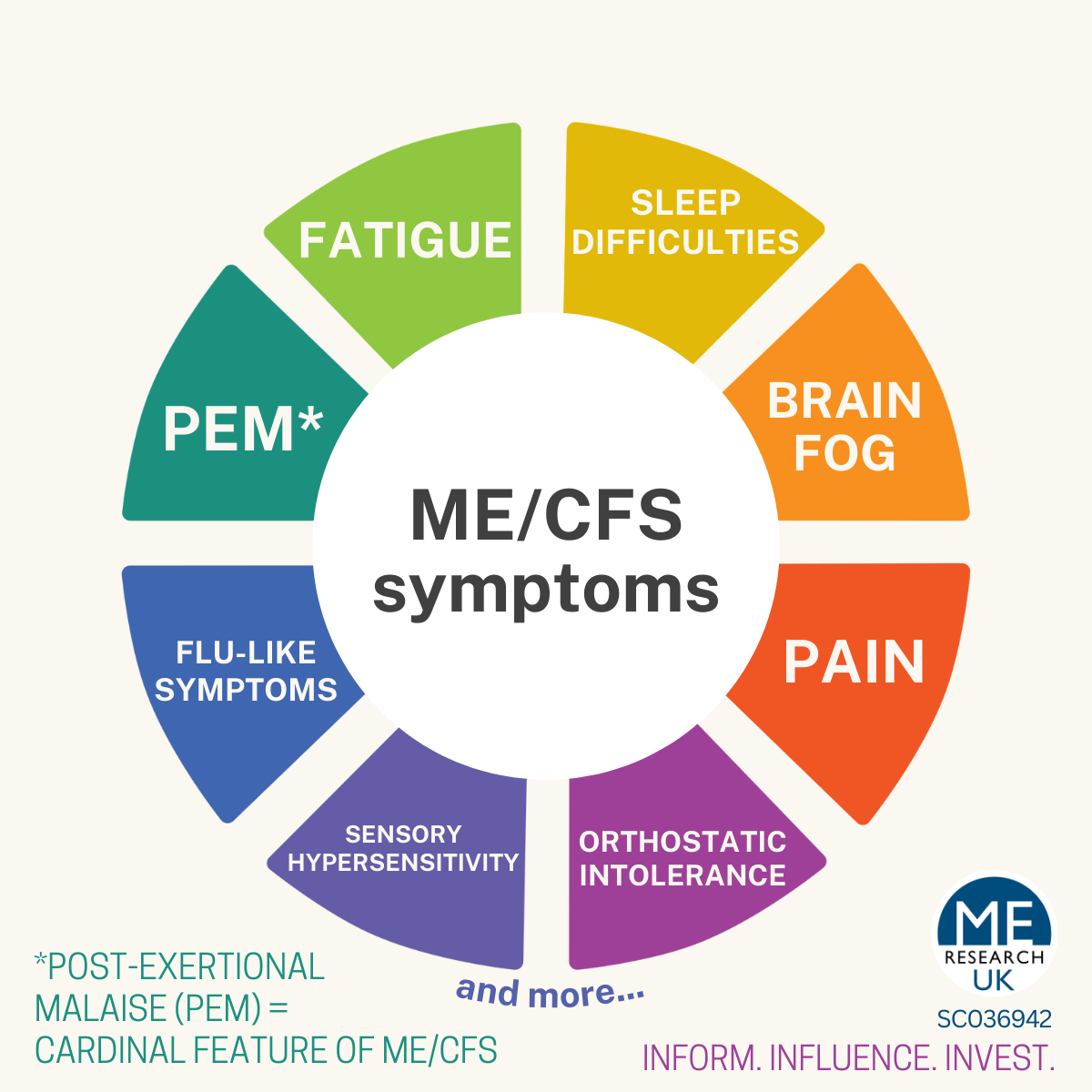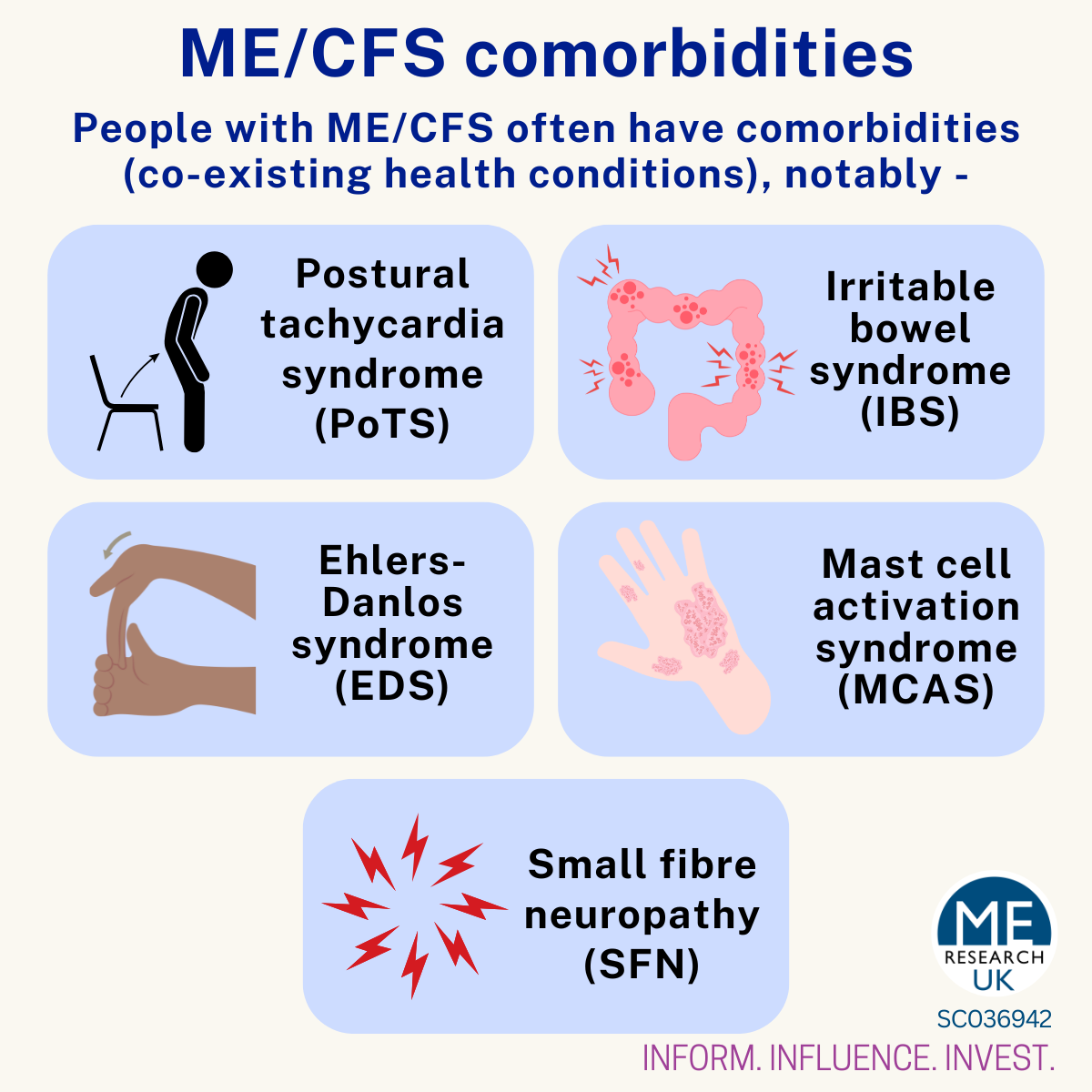ME/CFS is a complex and debilitating disease which extends far beyond fatigue. It encompasses a wide range of symptoms, such as: cognitive dysfunction, sleep disturbances, gastrointestinal issues and sensory hypersensitivity.
The cardinal feature of ME/CFS is post-exertional malaise (PEM), where even minimal physical or mental exertion can lead to a worsening of symptoms. Many individuals also have co-occurring conditions that further diminish their quality of life, making daily activities more challenging.
Symptoms
According to NICE, ME/CFS is characterised by four core symptoms.
Post-exertional malaise
Post-exertional malaise (PEM) is the hallmark feature of ME/CFS. It is a worsening of symptoms following even minor physical or mental exertion. PEM can occur within hours or days after an activity, and may last for days, weeks or longer. PEM is essentially like a volume dial, amplifying the intensity of symptoms.
“While an activity may cause immediate worsening of ME/CFS symptoms, the real impact – PEM – usually cannot be detected until hours or days after. In my experience, this delayed and unpredictable response is extremely difficult to manage, and for friends, family and colleagues to understand.”
Person with ME/CFS, 2025
Fatigue
Fatigue in ME/CFS is not just tiredness, it is profound, persistent exhaustion that is not sufficiently relieved by rest and significantly impacts daily activities.
“The most severe symptom that I have experienced daily has been unrelenting exhaustion. I often describe it as having a battery that is at a maximum of 10% full, draining quickly. Once the battery is drained, I cannot charge it.”
Person with ME/CFS, 2023
Cognitive dysfunction (“brain fog”)
Cognitive dysfunction, often referred to as “brain fog”, is more than occasional forgetfulness. It is a complex and distressing symptom involving issues with memory, concentration and information processing.
“Most people with ME/CFS have trouble thinking quickly, remembering things, and paying attention to details. People with ME/CFS often say they have ‘brain fog’ to describe this problem… because they feel ‘stuck in a fog’ and not able to think clearly.”
US Centers for Disease Control and Prevention, 2024
Sleep difficulties
Many people with ME/CFS experience unrefreshing sleep, whereby even after a full night’s sleep, they wake up exhausted. Additionally, individuals may experience sleep disturbances such as insomnia (difficulty falling asleep and/or staying asleep) and hypersomnia (excessive sleeping). Studies show that poor sleep quality correlates with reduced quality of life.
“I could sleep 10 to 12 hours a night, and I do, and I still don’t feel good in the morning… if I get less than 10 to 12 [hours] or if I have a bad night for whatever reason, I feel even worse.”
USA FDA, The Voice of the Patient, 2013
Additional symptoms
NICE also highlights the following symptoms as associated with, but not exclusive to, ME/CFS: pain, orthostatic intolerance (symptoms upon assuming an upright posture), autonomic dysfunction (improperly functioning nervous system), flu-like symptoms, sensory hypersensitivity, neuromuscular symptoms (such as twitching), and intolerance to alcohol/food/chemicals.
It is important to recognise that different disease criteria emphasise different symptoms. Usually fatigue, sleep difficulties, PEM (or equivalent) are compulsory for a diagnosis. Other frequently cited symptoms include cognitive dysfunction, pain, orthostatic intolerance and flu-like symptoms.
Comorbidities
ME/CFS often coexists with other conditions.
Postural orthostatic Tachycardia Syndrome (PoTS)
PoTS is a condition involving orthostatic intolerance, which includes an abnormal heart rate increase upon standing.
Irritable Bowel Syndrome (IBS)
A gut disorder causing bloating, abdominal pain and irregular bowel movements.
Ehlers-Danlos Syndrome (EDS)
A group of inherited connective tissue disorders characterised by unstable, hypermobile (extremely flexible) joints, and fragile, stretchy skin.
Mast Cell Activation Syndrome (MCAS)
A condition involving abnormal mast cell (immune cell) activity, leading to allergy-like symptoms.
Small Fibre Neuropathy (SFN)
A nerve disorder causing pain, numbness and autonomic dysfunction.
Individuals with ME/CFS may also experience co-occurring depression or anxiety, stemming from the impact of the disease on quality of life and the stigma associated with it, rather being direct symptoms of ME/CFS itself.




